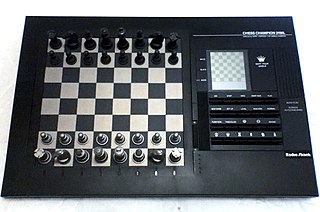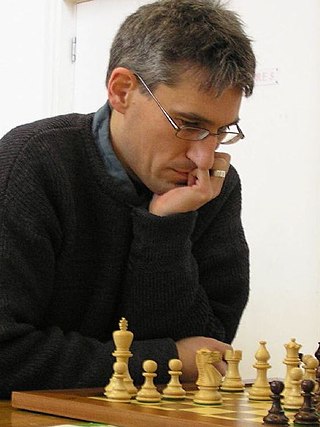Related Research Articles

Garry Kimovich Kasparov is a Russian chess grandmaster, former World Chess Champion (1985–2000), political activist and writer. His peak FIDE chess rating of 2851, achieved in 1999, was the highest recorded until being surpassed by Magnus Carlsen in 2013. From 1984 until his retirement from regular competitive chess in 2005, Kasparov was ranked world no. 1 for a record 255 months overall. Kasparov also holds records for the most consecutive professional tournament victories (15) and Chess Oscars (11).

Deep Blue was a chess-playing expert system run on a unique purpose-built IBM supercomputer. It was the first computer to win a game, and the first to win a match, against a reigning world champion under regular time controls. Development began in 1985 at Carnegie Mellon University under the name ChipTest. It then moved to IBM, where it was first renamed Deep Thought, then again in 1989 to Deep Blue. It first played world champion Garry Kasparov in a six-game match in 1996, where it lost four games to two. It was upgraded in 1997 and in a six-game re-match, it defeated Kasparov by winning two games and drawing three. Deep Blue's victory is considered a milestone in the history of artificial intelligence and has been the subject of several books and films.

Computer chess includes both hardware and software capable of playing chess. Computer chess provides opportunities for players to practice even in the absence of human opponents, and also provides opportunities for analysis, entertainment and training. Computer chess applications that play at the level of a chess grandmaster or higher are available on hardware from supercomputers to smart phones. Standalone chess-playing machines are also available. Stockfish, Leela Chess Zero, GNU Chess, Fruit, and other free open source applications are available for various platforms.

Vladimir Borisovich Kramnik is a Russian chess grandmaster. He was the Classical World Chess Champion from 2000 to 2006, and the 14th undisputed World Chess Champion from 2006 to 2007. He has won three team gold medals and three individual medals at Chess Olympiads.

Veselin Aleksandrov Topalov is a Bulgarian chess grandmaster and former FIDE World Chess Champion.
X3D Fritz was a version of the Fritz chess program, which in November 2003 played a four-game human–computer chess match against world number one Grandmaster Garry Kasparov. The match was tied 2–2, with X3D Fritz winning game 2, Kasparov winning game 3 and drawing games 1 and 4.

Peter Leko is a Hungarian chess grandmaster and commentator. He became the world's youngest grandmaster in 1994. He narrowly missed winning the Classical World Chess Championship 2004: the match was drawn 7–7 and so Vladimir Kramnik retained the title. He also came fifth in the FIDE World Chess Championship 2005 and fourth in the World Chess Championship 2007.

Teimour Boris oghlu Radjabov is an Azerbaijani chess grandmaster.

Fritz is a German chess program originally developed for Chessbase by Frans Morsch based on his Quest program, ported to DOS, and then Windows by Mathias Feist. With version 13, Morsch retired, and his engine was first replaced by Gyula Horvath's Pandix, and then with Fritz 15, Vasik Rajlich's Rybka.
Advanced chess is a form of chess in which each human player uses a computer chess program to explore the possible results of candidate moves. Despite this computer assistance, it is the human player who controls and decides the game.
Several methods have been suggested for comparing the greatest chess players in history. There is agreement on a statistical system to rate the strengths of current players, called the Elo system, but disagreement about methods used to compare players from different generations who never competed against each other.

The Classical World Chess Championship 2000, known at the time as the Braingames World Chess Championships, was held from 8 October 2000 – 4 November 2000 in London, United Kingdom. Garry Kasparov, the defending champion, played Vladimir Kramnik. The match was played in a best-of-16-games format, with Kramnik defeating the heavily favoured Kasparov. Kramnik won the match with two wins, 13 draws and no losses. To the supporters of the lineal world championship, Kramnik became the 14th world chess champion.

The World Chess Championship 2006 was a match between Classical World Chess Champion Vladimir Kramnik and FIDE World Chess Champion Veselin Topalov. The title of World Chess Champion had been split for 13 years. This match, played between September 23 and October 13, 2006, in Elista, Kalmykia, Russia, was to reunite the two World Chess Champion titles and produce an undisputed World Champion.

The Classical World Chess Championship 2004 was held from September 25, 2004, to October 18, 2004, in Brissago, Switzerland. Vladimir Kramnik, the defending champion, played Peter Leko, the challenger, in a fourteen-game match.

Anti-computer tactics are methods used by humans to try to beat computer opponents at various games, most typically board games such as chess and Arimaa. They are most associated with competitions against computer AIs that are playing to their utmost to win, rather than AIs merely programmed to be an interesting challenge that can be given intentional weaknesses and quirks by the programmer. Such tactics are most associated with the era when AIs searched a game tree with an evaluation function looking for promising moves, often with Alpha–beta pruning or other minimax algorithms used to narrow the search. Against such algorithms, a common tactic is to play conservatively aiming for a long-term advantage. The theory is that this advantage will manifest slowly enough that the computer is unable to notice in its search, and the computer won't play around the threat correctly. This may result in, for example, a subtle advantage that eventually turns into a winning chess endgame with a passed pawn.
Michael "Mig" Greengard is an American chess author and journalist who lives in New York City. Greengard also maintains the official English website of the Russian pro-democracy coalition, The Other Russia.

Daniel John King is an English chess grandmaster, writer, coach, journalist and broadcaster.
This article documents the progress of significant human–computer chess matches.
References
- ↑ Analysis of Game 6 Archived October 7, 2007, at the Wayback Machine , by Mig Greengard, Chessbase
- ↑ Fritz Defends to Draw Game 8 and the Match! Final score: 4-4, Chessbase, 19 October 2002
- ↑ "Who's the Pawn In This Match?" Archived January 6, 2007, at the Wayback Machine by Steve Kettmann, Wired, 2001-04-23, Retrieved 2006-09-25.
- ↑ Do Not Pass Go by David Levy, Guardian Unlimited, 2002-10-24, Retrieved 2006-09-25.